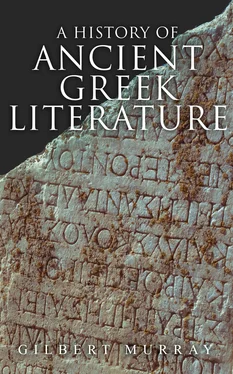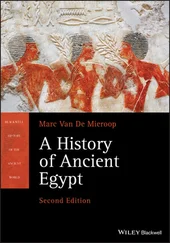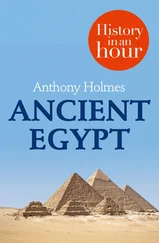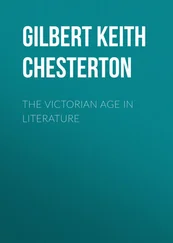A desire to make the most of my allotted space, and also to obtain some approach to unity of view, has led me to limit the scope of this book in several ways. Recognising that Athens is the only part of Greece of which we have much real knowledge, I have accepted her as the inevitable interpreter of the rest, and have, to a certain extent, tried to focus my reader's attention upon the Attic period, from Æschylus to Plato. I have reduced my treatment of Philosophy to the narrowest dimensions, and, with much reluctance, have determined to omit altogether Hippocrates and the men of science. Finally, I have stopped the history proper at the death of Demosthenes, and appended only a rapid and perhaps arbitrary sketch of the later literature down to the fall of Paganism, omitting entirely, for instance, even such interesting books as Theophrastus's Characters , and the Treatise on the Sublime .
In the spelling of proper names I have made no great effort to attain perfect consistency. I have in general adopted the ordinary English or Latin modifications, except that I have tried to guide pronunciation by leaving k unchanged where c would be soft, and by marking long syllables with a circumflex. Thus Kimon is not changed to Cimon, and Leptînes is distinguished from Æschines. I have not, however, thought it necessary to call him Leptînês, or to alter the aspect of a common word by writing Dêmêtêr, Thûkŷdidês. In references to ancient authors, my figures always apply to the most easily accessible edition; my reading, of course, is that which I think most likely to be right in each case. All the authors quoted are published in cheap texts by Teubner or Tauchnitz or the English Universities, except in a few cases, which are noted as they occur. Aristotle, Plato, and the Orators are quoted by the pages of the standard editions; in the Constitution of Athens , which, of course, was not contained in the great Berlin Aristotle, I follow Kenyon's editio princeps .
Philologists may be surprised at the occasional acceptance in my translations of ancient and erroneous etymologies. If, in a particular passage, I translate ὴλίιßατος 'sun-trodden,' it is not that I think it to be a 'contracted form,' of ὴλιόßατος but that I believe Euripides to have thought so.
An asterisk *after the title of a work signifies that the work is lost or only extant in fragments. Fragmentary writers are quoted, unless otherwise stated, from the following collections: Fragmenta Hisloricorum Grœcorum , by Karl Müller; Philosophorum , by Mullach; Tragicorum , by Nauck; Comicorum , by Kock; Epicorum , by Kinkel; Poeta, Lyrici Grœci , by Bergk. These collections are denoted by their initial letters, F. H. G., F. P. G., and so on. C. I. A. is the Corpus Inscriptionum Atticarum, C. I. G. the Corpus Inscriptionum Grœcarunz. In a few cases I have used abbreviations for a proper name, as W. M. for Wilamowitz-Moellendorff, but not, I think, in any context where they are likely to be misunderstood.
Among the friends who have helped me with criticisms and suggestions, I must especially express my indebtedness to Mr. GEORGE MACDONALD, lecturer in Greek in this University, for much careful advice and correction of detail throughout the book.
GILBERT MURRAY.
GLASGOW, February 1897.
Table of Contents
IN attempting to understand the scope and development of Greek literature, our greatest difficulty comes from the fragmentary and one-sided nature of our tradition. There has perhaps never been any society in history so near to the highest side of our own as the Athens of Euripides and Plato. The spiritual vividness and religious freedom of these men, the genuineness of their culture and humanity, the reasoned daring of their social and political ideals, appeal to us almost more intimately than does our own eighteenth century. But between us and them there has passed age upon age of men who saw differently, who sought in the books that they read other things than truth and imaginative beauty, or who did not care to read books at all. Of the literature produced by the Greeks in the fifth century B.C., we possess about a twentieth part; of that produced in the seventh, sixth, fourth, and third, not nearly so large a proportion. All that has reached us has passed a severe and far from discriminating ordeal. It has secured its life by never going out of fashion for long at a time; by appealing steadily to the book-trade throughout a number of successive epochs of taste -- fourth-century Greece, pre-Christian Alexandria, Augustan Rome, the great Hellenic revival of the Antonines, the narrower Attic revival of the later sophists.
After the death of Julian and Libanius, one is tempted to think that nobody was really interested in literature any more; but certain books had long been conventionally established in the schools as 'classics,' and these continued to be read, in ever-dwindling numbers, till the fall of Constantinople and the Renaissance. The eccentricities of the tradition would form material for a large volume. As in Latin it has zealously preserved Vergil and Avianus the fabulist, so in Greek it has multiplied the MSS. of Homer and of Apollonius the Kitian On Sprains. As in Latin it practically lost Lucretius save for the accident of a single MS., and entirely lost Calvus, so in Greek it came near to losing Æschylus, and preserved the most beautiful of the Homeric hymns only by inadvertence. In general, it cared for nothing that was not either useful in daily life, like treatises on mechanics and medicine, or else suitable for reading in schools. Such writers as Sappho, Epicharmus, Democritus, Menander, Chrysippus, have left only a few disjointed fragments to show us what precious books were allowed to die through the mere nervelessness of Byzantium. But Rome and Alexandria in their vigour had already done some intentional sifting. They liked order and style; they did not care to copy out the more tumultuous writers. The mystics and ascetics, the more uncompromising philosophers, the ardent democrats and the enthusiasts generally, have been for the most part suppressed. We must remember that they existed, and try from the remains to understand them.
But the first great gaps in the tradition are of a different nature. An immense amount of literature was never 'preserved' at all. It is generally true that in any creative age the living literature is neglected. It is being produced every day; and why should any one trouble himself to have it copied on good material and put in a safe place? It is only that which can no longer be had for the asking that rouses men's anxiety lest it cease altogether. This is what happened among the Greeks in tragedy, in lyric poetry, in oratory, and in the first great movement of history. The greater part of each genus was already extinct by the time people bethought them of preserving it. Especially was it the case in the earliest form of composition known to our record, the hexameter epos.
The epos, as we know it, falls into three main divisions according to author and subject-matter. It is a vehicle for the heroic saga, written by ' Homêros'; for useful information in general, especially catalogues and genealogies, written by ' Hêsiodos'; and thirdly, for religious revelation, issuing originally from the mouths of such figures as 'Orpheus,' 'Musæus,' and the 'Bakides.' This last has disappeared, leaving but scanty traces, and the poems of ' Homer and Hesiod' constitute our earliest literary monuments.
All verse embodiments of the saga are necessarily less old than the saga itself. And more than that, it is clear that our Iliad, Odyssey, Erga, and Theogony are not the first, "nor the second, nor yet the twelfth," of such embodiments. These ostensibly primitive poems show a length and complexity of composition which can only be the result of many generations of artistic effort. They speak a language out of all relation to common speech, full of forgotten meanings and echoes of past states of society; a poet's language, demonstrably built up and conditioned at every turn by the needs of the hexameter metre. There must therefore have been hexameter poems before our Iliad. Further, the hexameter itself is a high and complex development many stages removed from the simple metres in which the sagas seem once to have had shape in Greece as well as in India, Germany, and Scandinavia. But if we need proof of the comparative lateness of our earliest records, we can find it in ' Homer' himself, when he refers to the wealth of poetry that was in the world before him, and the general feeling that by his day most great themes have been outworn. 1
Читать дальше












